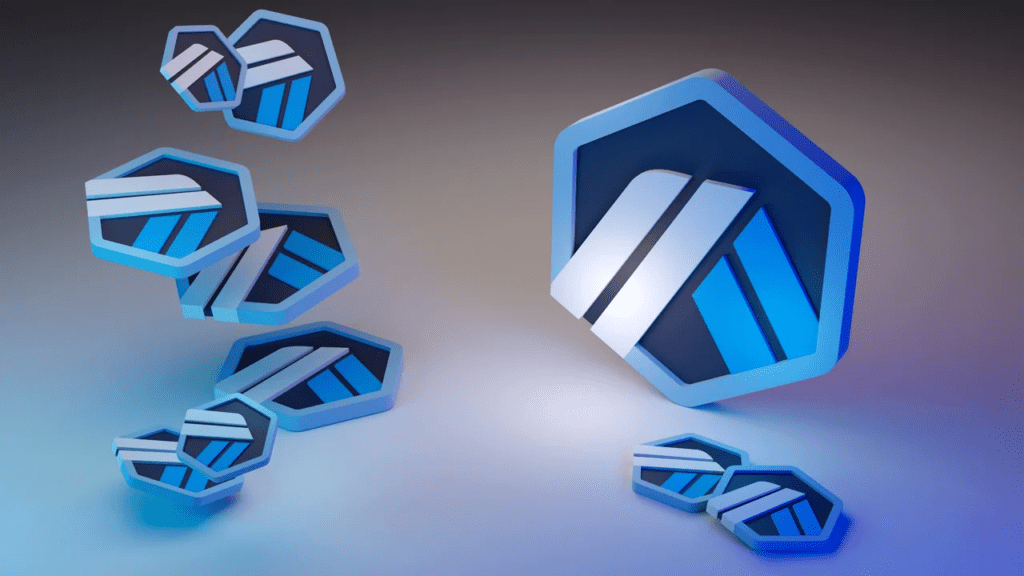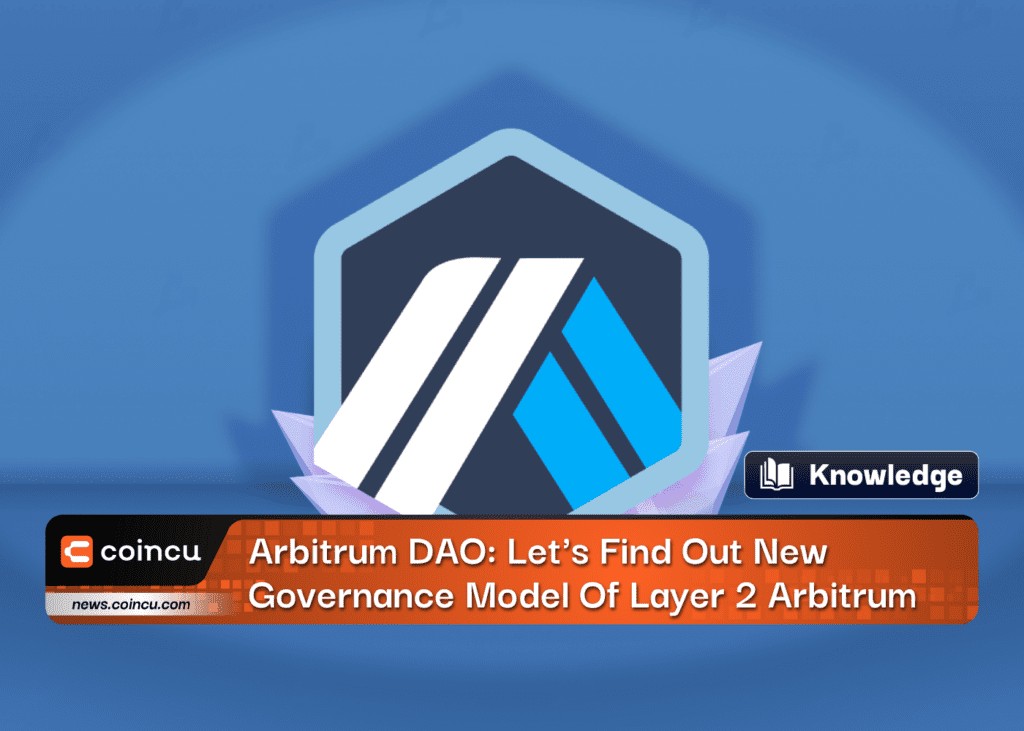Key Points:
- The Arbitrum DAO’s governance mechanism is steadily being adjusted, as the first Arbitrum improvement ideas have been put on the community forum.
- ARB tokens may be used to vote for or against the Arbirtrum DAO’s governance proposals.
- The Arbitrum DAO will be able to start APIs, which users will be able to vote on, and if authorized, “chain owner” will put them to use.
Decentralized Finance, also known as DeFi, has been more popular in recent years, sparking interest in decentralized autonomous organizations (DAOs) among blockchain and cryptocurrency aficionados.
Blockchain technology and its uses are fast changing, and one of the fascinating developments is the growth of DAOs.
Arbitrum, a long-established layer project in the crypto community, has just launched its ARB token and the first massive airdrop after everyone’s anticipation. In addition, it also launched the Arbitrum DAO to distribute governance through the ARB token.

This article will offer an overview of Arbitrum’s governance, the Arbitrum DAO, and the process of launching proposals and voting.
What is Arbitrum DAO?
Arbitrum is a protocol that aims to make Ethereum transactions quicker and less expensive. Arbitrum is used by developers to create user-friendly decentralized applications (dApps) that benefit from the scalability of the Arbitrum Rollup and AnyTrust protocols. Arbitrum has two primary chains that implement these protocols, Arbitrum One and Arbitrum Nova.
Arbitrum One and Arbitrum Nova, as well as their underlying protocols, may now be governed by decentralized thanks to the release of the ARB governance token.
In 2021, Arbitrum introduces Arbitrum One. This was quickly followed by the launch of Arbitrum Nova, a standalone AnyTrust chain purpose-built for ultra-low-cost transactions.
In August 2022, after performance issues were exposed in Odyssey, Arbitrum One upgraded to the Arbitrum Nitro stack, increasing its scaling capabilities by 7-10x.
The three versions of Arbitrum are One, Nitro, and Nova. Among them, Nitro is an upgrade of One’s technology stack, not a network independent of One. The full name of Nitro after the upgrade is Arbitrum One and Nova, which was launched in early August, and is a network independent of One.
The core difference between One/Nitro and Nova is data availability. One’s data availability is on-chain (Ethereum mainnet), while Nova’s data availability is off-chain (Data Availability Committee DAC).
The distribution of the ARB governance token enables decentralized governance of Arbitrum One and Arbitrum Nova and their underlying protocols.
ARB, like most tokens, is called a governance token, and its main function is limited to governance. Let’s first review the process of traditional Web2 governance and Web3 governance for comparison.
Traditionally, Web2 technologies have been built by board-managed companies. This board is usually a small group of people elected by shareholders. When company decisions need to be made, board members meet and vote.
The decision-making agreement of the board of directors is not always visible to the shareholders. Although the board of directors has an obligation to bear the responsibility to the shareholders, the shareholders must trust the board of directors. This trust relationship sounds counter-intuitive, but it is statutory and enforced by law.
Whereas Web3 technologies such as Arbitrum are typically initially built by a company that manages aboard. Once these technologies have achieved product-market fit and a community of users and stakeholders has formed, decision-making power in the company can be gradually decentralized.
To achieve decentralized governance, the Arbitrum DAO distributes ARB governance tokens. By holding these tokens, users have a stake in the governance process, allowing them to vote on proposals that shape the future of the Arbitrum protocol. Token holders can either vote directly on proposals or delegate their voting power to trusted representatives, known as delegates.
How is the Arbitrum DAO structured?
Governance
This community consists of all ARB token holders and their designated delegates. They have the authority to make choices that impact the whole Arbitrum ecology, such as changing the Security Council’s powers or perhaps abolishing it entirely.
The Arbitrum DAO governance contract is deployed on-chain, and DAO members may vote on AIP via ARB (Arbitrum improvement proposal).
AIPs are classified into two types: constitutional AIPs and non-constitutional AIPs.
- Constitutional AIPs include: modifying DAO rules, installing or modifying any on-chain software, taking any action that requires a “chain owner,” and approving a new chain.
- Non-constitutional AIPs include: recommending how to spend or distribute monies from the DAO treasury; and providing community advice or information.
Arbitrum, like the Internet Computer, is totally controlled on-chain and binding. Other protocols often allow users to vote for Snapshots, which are subsequently delegated to multisig developers for implementation.
This strategy, however, does not always assure that all recommended changes are adopted, and it is less efficient than centralized implementation.
Treasury
Arbitrum DAO features a built-in financing contract, the Treasury, which is utilized for continuous protocol development and maintenance. DAO members may submit suggestions and vote on how to spend treasury money.
Security Committee
The Security Committee is another built-in security mechanism in Arbitrum DAO. The Security Committee is in charge of guaranteeing the DAO’s and the Arbitrum chain’s security and integrity, as well as acting quickly in emergency circumstances and skipping the cumbersome voting procedure.
This council is made up of 12 chosen organizations that are in charge of assuring the security and performance of the Arbitrum protocol. The DAO elects members of the Security Committee in semi-annual elections.
Arbitrum governance
There are four primary participants in Arbitrum’s governance process:
Holders of ARB Tokens: Individuals who have the capacity to propose, vote on, and execute against the Arbitrum DAO-approved chain.
Directors: Since the Arbitrum Foundation is based in the Cayman Islands, at least one director must be in charge of management and operations.
Security Council: 12 members of the 9-12 multi-signature wallet capable of enforcing Arbitrum DAO voting outcomes as well as emergency actions in charge of preserving the Arbitrum chain.
Special Grant: Distributed by the Arbitrum Foundation.
How to participate in the Arbitrum DAO?
There are numerous methods to join the Arbitrum DAO:
- Delegate your voting power: If you don’t have the time or resources to engage in the DAO’s governance, you may still voice your opinion by delegating your voting rights to others. It is critical to choose someone who shares your ideals, and in whom you have faith.
- Self-delegate and vote directly: If you like to be hands-on, you may self-delegate and vote on DAO proposals directly.
- Become a delegate: Committed members of the community may become delegates, voting on behalf of other token holders who entrust them with voting power.
- Engage in governance discussions: Join the debate on the Arbitrum DAO governance forum and offer your opinions on proposals and decisions.
- Join the Arbitrum community on Discord: Communicate with other Arbitrum members by participating in Discord channels and conversations.
Conclusion
Although the debut of ARB took longer than projected in comparison to direct rivals such as Optimism, Arbitrum had accomplished crucial technological milestones such as functioning fraud proofs, outperforming its major opponent by a substantial margin.
The ARB airdrop formally transfers Arbitrum’s governance powers to Arbitrum DAO, ushering in the age of decentralized government.
The release of ARB represents a significant milestone for Arbitrum and the L2 ecosystem as a whole. As more projects investigate Layer-2 scaling solutions, the creation of a governance token for one of the major solutions, such as Arbitrum, is strong evidence of the ecosystem’s maturity.
Ultimately, Arbitrum DAO is a strong tool for decentralized governance and community administration of the Arbitrum ecosystem. Anyone may directly influence the future of Arbitrum and Ethereum by owning ARB tokens and participating in the governance process.
DISCLAIMER: The Information on this website is provided as general market commentary and does not constitute investment advice. We encourage you to do your own research before investing.
Join us to keep track of news: https://linktr.ee/coincu
Harold
Coincu News





